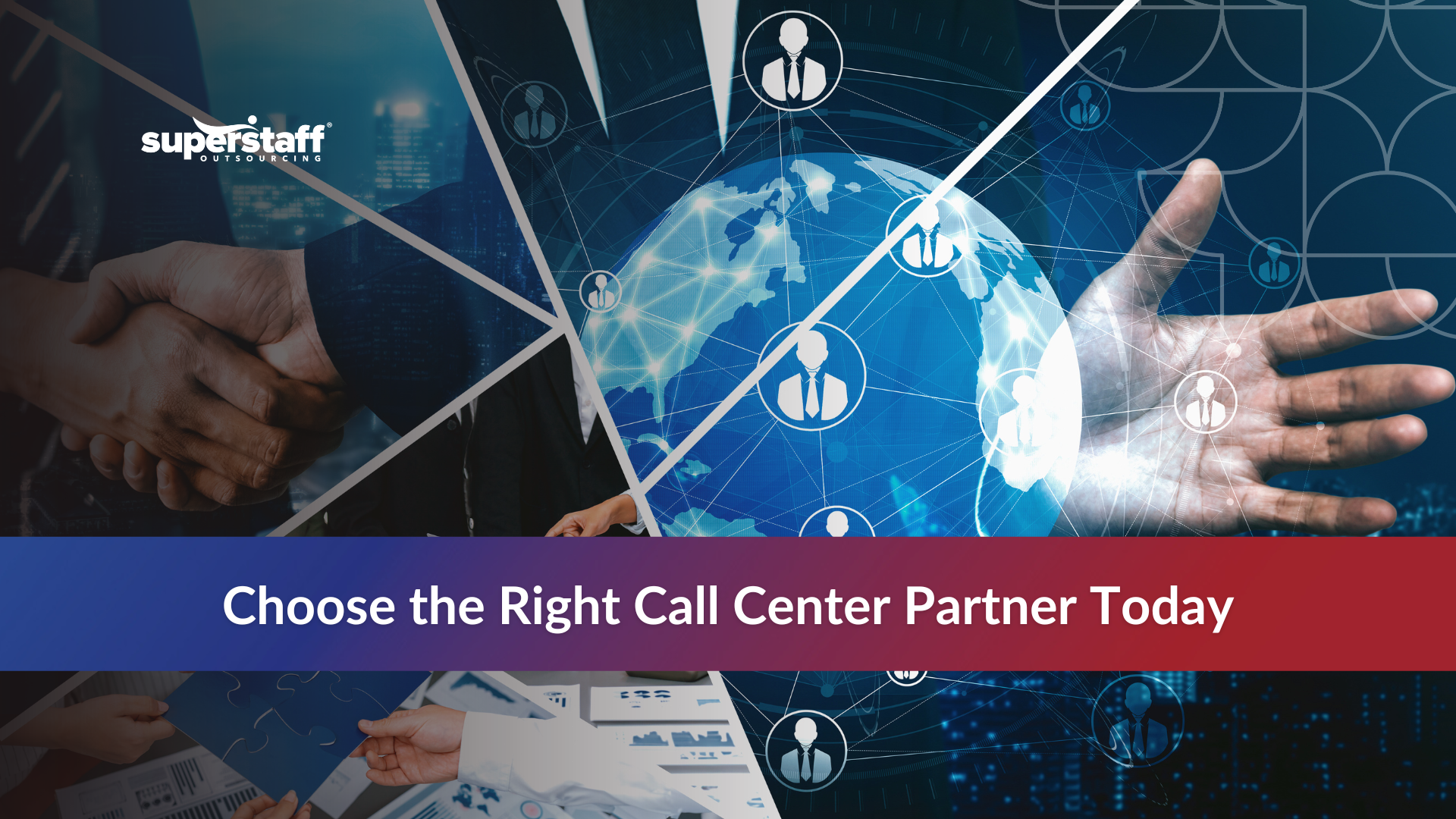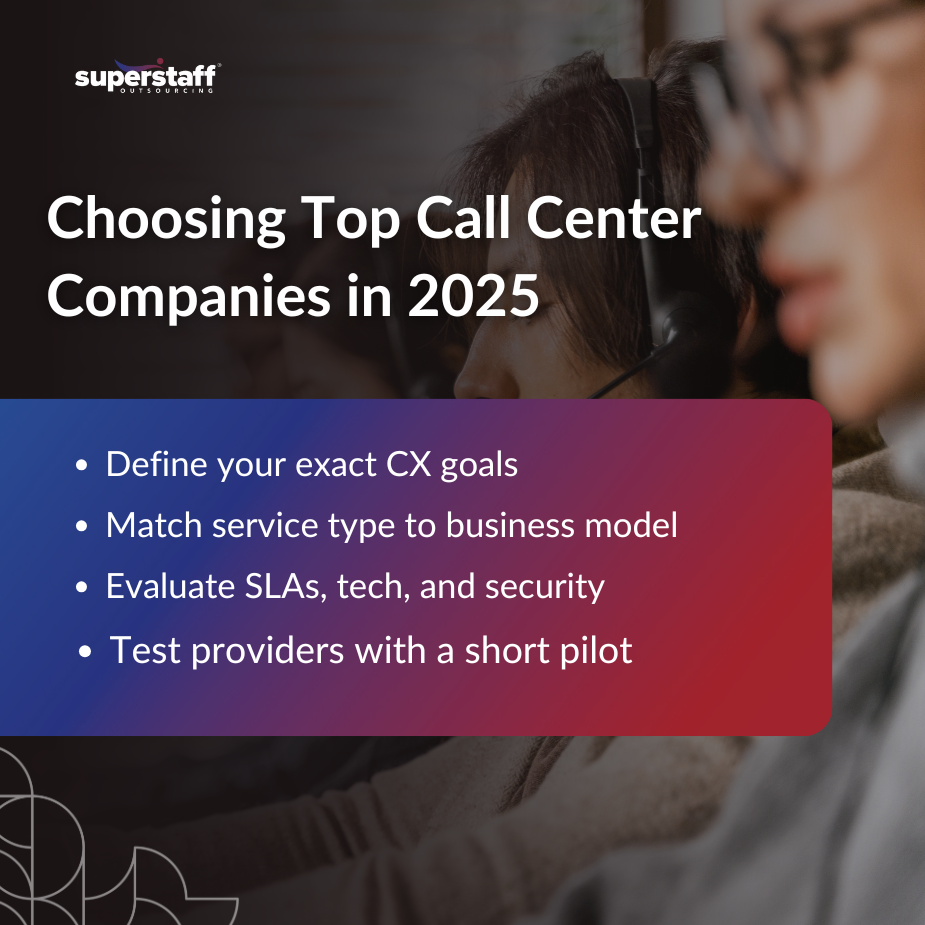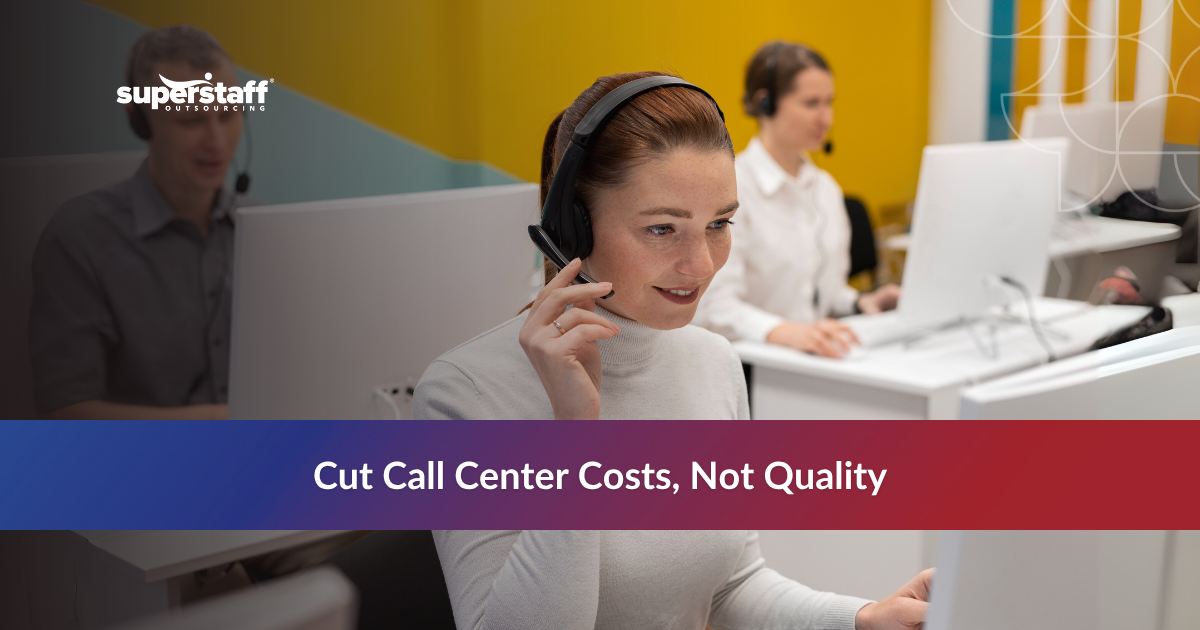
Choosing the right call center partner can make or break your customer experience. For many growing companies, especially SMEs and midmarket businesses, outsourcing isn’t just a cost move—it’s a strategic decision that directly impacts customer satisfaction, brand perception, and operational efficiency. With hundreds of vendors globally claiming to be among the top call center companies, the real challenge lies not in finding options but in filtering through the noise.
This 2025 guide breaks down what to look for when comparing call center partners—and how to make the best choice for your business. Whether you’re outsourcing for the first time or re-evaluating an existing partnership, the goal is simple: make informed, confident decisions based on alignment, value, and performance.

Define Your Business Needs First
Before comparing providers, you need clarity on your own business requirements. Jumping straight into vendor comparisons without this step leads to mismatched expectations and disappointing results. Start by mapping out what kind of call center services outsourcing arrangement will serve your goals. Are you looking for inbound support for handling high volumes of customer inquiries, outbound sales calls, or a mix of both? Do you need multilingual capabilities, 24/7 support, or seasonal flexibility? The top call center companies will only add value if their capabilities truly align with your operational needs and strategic priorities.
Be specific about your pain points and objectives. Perhaps your internal team is overwhelmed, and you need to improve CSAT scores. Maybe you’re scaling fast and require consistent service across time zones. Defining scope, volume, channels, and expected outcomes will help you compare the top call center companies based on how well they align with your reality.
Know the Core Call Center Service Types
Once your needs are clear, understanding the landscape of call center service types is crucial. Not all providers are the same. Some specialize in inbound customer service, while others excel at outbound campaigns or blended models. There are options for shared agents (cost-effective, flexible) versus dedicated agents (brand-trained, consistent), depending on the nature of your business and how critical personalized service is.
Industry specialization is another factor. If you’re in healthcare, you’ll need a partner familiar with HIPAA standards. Retail-focused providers might be more agile with peak-season surges. Financial services require secure, regulation-compliant handling of sensitive data. Identifying which segment of the top call center companies fits your business model helps you avoid one-size-fits-all solutions that ultimately don’t scale.
Key Evaluation Criteria When Comparing Providers
With your shortlist forming, the next step is building a consistent evaluation framework. Every provider will say they’re great—but you need proof. Start by examining their track record. Do they have relevant client case studies? Can they provide references from businesses in your industry?
Service Level Agreements (SLAs) are non-negotiable. Look closely at their commitments on response times, resolution rates, and system uptime. These metrics will define your customers’ experience. Review their agent training processes—how are representatives onboarded, and how is quality maintained over time?
Consider their ability to support omnichannel customer journeys, especially if you operate across voice, email, chat, and social. Do they offer multilingual support? Are their security protocols and compliance standards transparent and documented? When comparing top call center companies, use these metrics to guide the conversation and eliminate guesswork.
Cultural Fit and Communication Style Matter
Beyond numbers, business leaders know that relationships drive long-term success. One of the most overlooked but essential criteria is cultural fit. This is especially important when outsourcing customer-facing functions like support or sales. The tone, empathy, and communication style of your agents must reflect your brand values.
Assess how the provider communicates with you during the evaluation process. Are they proactive or reactive? Do they listen well or push templated solutions? Consider whether their internal culture—collaboration, transparency, flexibility—aligns with yours. Many of the top call center companies may check the technical boxes, but not all will make strong, collaborative partners.
Understand Pricing Structures and True Cost
Price matters, but it’s not everything. One of the biggest mistakes businesses make is choosing a partner based solely on a lower hourly rate. Instead, focus on total cost of ownership. Ask for detailed breakdowns of pricing models: Do they charge per-minute, per-agent, or per-outcome? What setup fees, overtime rates, or licensing costs might apply?
Compare providers by the value they offer, not just the number. A slightly higher rate might come with faster resolutions, better-trained agents, or stronger account support. In the long run, these extras reduce churn and improve NPS. The most successful top call center companies will help you calculate ROI, not just send you a rate card.
Request the Right Questions in Your RFP
If you’re issuing a Request for Proposal (RFP), make it count. Generic questions won’t reveal the real differentiators between vendors. Instead, use scenario-based inquiries that test how providers handle real-life issues. Ask how they manage sudden volume spikes, agent absenteeism, or client escalations.
Request sample reports to evaluate their analytics and transparency. Ask about disaster recovery protocols and how quickly they can scale teams. Include queries about their technology platforms and whether they allow integration with your existing systems. These questions help you separate marketing promises from operational readiness—a key consideration when vetting top call center companies.
Create a Shortlist and Pilot if Possible
Once proposals are in, it’s time to narrow the field. Choose two or three of the most promising candidates for deeper evaluation. If budget and timeline allow, run a short pilot program. Even a 30-day trial can reveal operational strengths and gaps you wouldn’t notice in a pitch deck.
During this trial, pay attention to responsiveness, communication, issue resolution, and how well they absorb feedback. Observe how their team adapts to your systems and workflows. The most successful outsourced customer support services are those that feel like an extension of your internal team.
If a full pilot isn’t possible, try a phased ramp-up with careful checkpoints. This allows you to test real-world performance without committing too early.
Top Call Center Companies: How to Make the Final Call
Ultimately, the best call center partner for your business is one that aligns with your goals, values, and growth plan. By the time you reach the decision point, you should feel confident not just in the provider’s capabilities, but in the partnership potential. Have they listened closely to your needs? Can they scale with you? Do they offer strategic input beyond staffing?
Remember what to look for in a BPO call center partner in 2025: flexibility, industry knowledge, cultural alignment, data transparency, and a commitment to service excellence. Price is only one part of a much bigger picture.
Ready to explore call center solutions that meet your exact needs? Talk to SuperStaff to see how we deliver performance, flexibility, and real partnership through outsourced customer support services. We understand what decision-makers are looking for in call center services outsourcing—and we’re ready to prove why we’re among the top call center companies in the industry.






